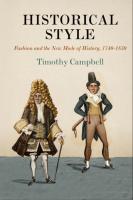Synopsis
My research focuses upon the literature and culture of eighteenth-century and Romantic Britain, and especially upon the visual-cultural and consumer-material practices of the age that helped reshape literature into new and long-enduring forms. I also have broad interests in the history and theory of fashion, in problems of historical method in literary studies, and in the forms of historiographical writing. In recent work I have addressed subjects ranging from the history of the fashion plate to Romantic antiquarianism, and from the fashionable, eighteenth-century portraiture of Sir Joshua Reynolds to the present-day conceptual dress art of Christian Boltanski.
Biography
My first book, Historical Style, connects the rise of historical self-consciousness during the long eighteenth century in Britain—which culminated in the bestselling historical novels of Walter Scott and his contemporaries in the early nineteenth century—to the emergence of a fashion system. Most iconically realized in dated representations of fashionable dress in print (the so-called “dress of the year”), this fashion system summoned fashion plates, portraits, social caricatures, and periodical writings as part of sweeping project to make the “time” of social life newly concrete. As Britons of the age themselves came to recognize, their novel sense of history depended in surprising ways on rhythms of commercial life that increasingly held their attention. In the first part of the book, I emphasize how irruptions of the past proliferated as a consequence of fashion’s more visible cycles, especially as the detritus of these cycles piled up and obsolete fashions repeatedly returned. In the second part of the book, I show how the new genre of historical fiction learned (by turns) to summon, to manage, and to resent fashion’s power to conjure history—and so confronted the paradoxical dependence of the age’s newly sophisticated historical thought upon fashion as a domain set apart from history: a necessary supplement for history’s own procedures.
My second book in progress, Arts of Dress, extends these concerns (and my earlier focus on the visual and textual archive of fashion) to material dress objects and traces the foundational influence of dress upon the broader course of aesthetics from the eighteenth century onward. I particularly focus on the insights of conceptually-oriented contemporary designers and artists and on the distinctive archival provocations of eighteenth-century period objects to summon the special capacities of presentness residing in all dress. Work from this project is now forthcoming in Critical Inquiry, Eighteenth-Century Fiction, and Studies in Romanticism.
At Chicago, I regularly teach graduate and undergraduate courses in the literature, arts and culture of eighteenth-century Britain; in British Romantic fiction and poetry; in the history and theory of fashion from the Renaissance to Alexander McQueen; and in visual and sound media studies. I am a regular participant in the Eighteenth- and Nineteenth-Century Cultures graduate workshop on campus; an affiliate of the Nicholson Center for British Studies; and a frequent contributor to Object Cultures Project events. At the Newberry Library, I co-organize the Eighteenth-Century Seminar under the auspices of the Center for Renaissance Studies.
Select Publications
Book
- Historical Style: Fashion and the New Mode of History, 1740-1830 (Penn, 2016)
Finalist for the 2017 Kenshur Prize for the best book in any discipline of eighteenth-century studies
Essays
- "Arts of Dress: Rancière and Fashion." Critical Inquiry(forthcoming).
- "Soft Materiality: Dress and Material Fiction in T.S. Surr's A Winter in London." Eighteenth-Century Fiction (forthcoming).
- "Romantic Dispersals: Afterlives of Dress and the Archive." Studies in Romanticism (forthcoming).
- “Pennant’s Guillotines and Scott’s Antiquary: The Romantic End of the Present,” Romantic Circles Praxis, Special Issue on Romantic Antiquarianism (June 2014)
- “Fashion, Microcosm, and Romantic Historical Distance,” in Rethinking Historical Distance: Varieties of Historical Engagement, ed. Mark Salber Phillips, Barbara Caine, and Julia Adeney Thomas (Palgrave, 2013).
- "'The Business of War': William Godwin, Enmity, and Historical Representation," ELH 76.2 (2009): 343-69.

